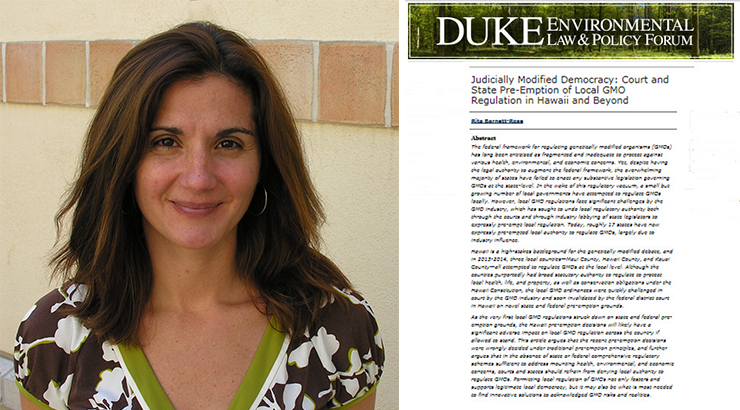
Fowler Law Professor Rita Barnett-Rose Publishes Article in Duke Environmental Law & Policy Forum
October 4, 2016
Chapman University Dale E. Fowler School of Law Professor Rita Barnett-Rose’s article “Judicially Modified Democracy: Court and State Pre-Emption of Local GMO Regulation in Hawaii and Beyond” was recently published in Volume 26, Number 1 of the Duke Environmental Law & Policy Forum.
From the abstract:
The federal framework for regulating genetically modified organisms (GMOs) has long been criticized as fragmented and inadequate to protect against various health, environmental, and economic concerns. Yet, despite having the legal authority to augment the federal framework, the overwhelming majority of states have failed to enact any substantive legislation governing GMOs at the state-level. In the wake of this regulatory vacuum, a small but growing number of local governments have attempted to regulate GMOs locally. However, local GMO regulations face significant challenges by the GMO industry, which has sought to undo local regulatory authority both through the courts and through industry lobbying of state legislators to expressly pre-empt local regulation. Today, roughly 17 states have now expressly pre-empted local authority to regulate GMOs, largely due to industry influence.
Hawaii is a high-stakes battleground for the genetically modified debate, and in 2013-2014, three local counties – Maui County, Hawaii County, and Kauai County – all attempted to regulate GMOs at the local level. Although the counties purportedly had broad statutory authority to regulate to protect local health, life, and property, as well as conservation obligations under the Hawaii Constitution, the local GMO ordinances were quickly challenged in court by the GMO industry and soon invalidated by the federal district court in Hawaii on novel state and federal pre-emption grounds.
As the very first local GMO regulations struck down on state and federal pre-emption grounds, the Hawaii pre-emption decisions will likely have a significant adverse impact on local GMO regulation across the country if allowed to stand. This article explains why the recent pre-emption decisions were wrongly decided under traditional pre-emption principles, and further argues that in the absence of state or federal comprehensive regulatory schemes sufficient to address mounting health, environmental, and economic concerns, courts and states should refrain from denying local authority to regulate GMOs. Permitting local regulation of GMOs not only fosters and supports legitimate local democracy, but it may also be what is most needed to find innovative solutions to acknowledged GMO risks and realities.
Rita Barnett-Rose is a Professor of Legal Research and Writing at Chapman University Dale E. Fowler School of Law. Prior to joining Chapman in 2008, Professor Barnett was a Professor of Legal Writing at California Western School of Law and a former LRW adjunct professor at Whittier School of Law. She received her JD from the University of Texas, where she graduated with honors, and her B.A. in English from Barnard College of Columbia University, where she graduated cum laude. Prior to her teaching career, Professor Barnett was an associate with the international law firm of Latham & Watkins, practicing mainly in the area of intellectual property. She then joined the corporate boutique firm of Whalen, LLP, where she engaged in both general corporate and IP transactional work. Professor Barnett has also served as a juvenile dependency attorney in the San Diego juvenile courts. While at the University of Texas School of Law, Professor Barnett was a staff member of the Texas Environmental Law Journal, where her Note “You Didn’t Tell Me Your Lights Were Off: Negligence Per Se and Violations of EPCRA — Will It Work?” was published. A member of the State Bar of California, Professor Barnett’s pro-bono work has included services for the California Lawyers for the Arts, Orangewood Children’s Home, and the Second Harvest Food Bank. She has served as an Assistant Editor for the Journal of Legal Writing and has published several articles, including articles on legal writing pedagogy, health care, and food law. Other articles include “Compulsory Water Fluoridation: Justifiable Public Health Benefit or Human Experimental Research Without Informed Consent?” William & Mary Environmental Law and Policy Review (2014) and “Reduce, Reuse and Recycle: How Using ‘Recycled’ Simulations in an LRW Course Benefits Students, LRW Professors, and the Relevant Global Community,” University of Daytona Law Review (2014).

